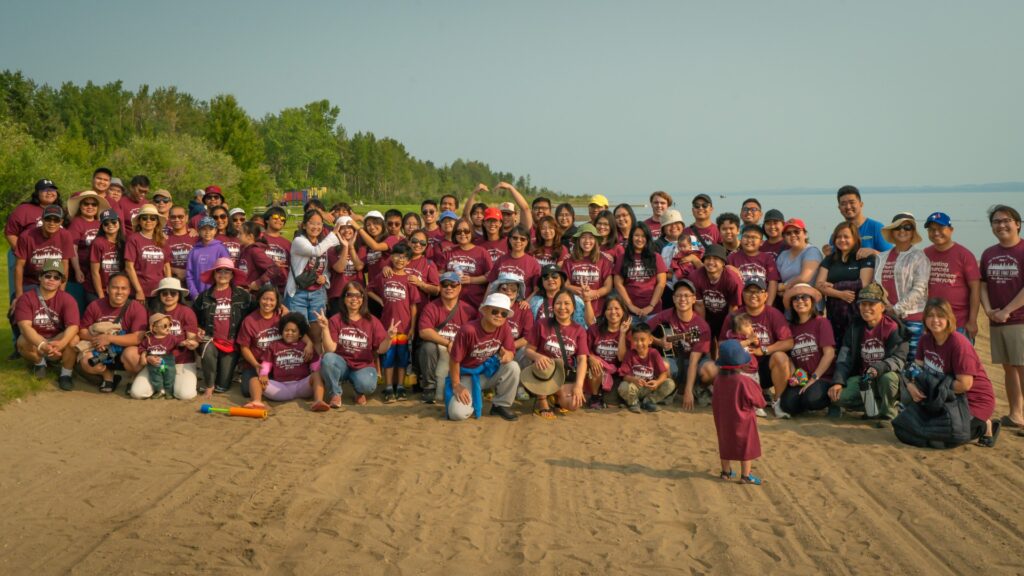Filipino International Baptist Church (FIBC) did not always have church planting on their mind. The 26-year-old church first began as a community Bible study that grew to a congregation, but it was not until 2008, when Pastor Neil Manzano transitioned into leadership, that FIBC embraced a church planting vision.
Today, the church supports two church plants (something they like to call adopting a church plant), has planted three satellite churches out of their congregation, and witnessed two granddaughter churches form. In just 15 years, FIBC’s impact has rippled into the birth of eight new churches in and around their city.
“The idea is we’re not just going to plant one church, but we’re going to plant reproducing churches,” said Pastor Manzano.
Nate Vedoya, the Send City Missionary in Edmonton and the son of FIBC’s founding pastor, shared, “It’s not been without its bumps and hiccups along the way, but they figured out a system that works in our context here in Edmonton, where we could see rapid multiplication and where we could discover, develop and deploy leaders at a pace that is sustainable and reproducible.”
For FIBC, partnering with Send Network has been pivotal. Vedoya believes it was Manzano’s leadership and guidance, coupled with the church’s partnership with Send Network and the Canada National Baptist Convention (CNBC) that caused FIBC to catch a vision for multiplication. Pastor Manzano pointed to Send Network’s financial support of church planters as one of the reasons his church has been able to consistently send out planters.
FIBC’s journey toward multiplication began with practical and intentional steps. First, the church started praying that God would allow them to plant two churches from their congregation. In 2012, FIBC started supporting a church plant financially, and in 2015, they took another church plant under their wing and even sent some of their members to help in the new work.
“It’s a culture of evangelism and a culture of discipleship that will lead into a desire to really invest in church planting both financially and even by sending off members,” said Manzano.
By 2016, when FIBC planted their first satellite church, they had already gained some experience in church planting by supporting other independent works in the past. “It’s really helpful for the church and the congregation to see how it is to take care of a church plant,” Manzano said, “It made it easier for them to see that we can do church planting, and we can send the church planter and team from our congregation.”
Planting churches is a challenge that has gotten easier each time. With an attendance of around 100, whenever FIBC sends out members to serve as a church planting team, they feel the vacuum. It’s created an effect that’s inspired more members to fill service vacancies, naturally creating a pipeline of church planting team members.
Send Network’s Mobilization Pathway outlines achievable steps each church can take – no matter their size or age – to start planting churches. Much like FIBC, churches can start by praying for church planters and investing financially in the primary SBC offerings. They can take a next step by partnering with a specific church plant, and step even deeper into God’s kingdom activity by sending out a church planter and team from their own church.
A spirit of generosity is key when embracing a church planting vision. “We don’t want to protect or preserve our resources for the sake of the local church,” Manzano said, “but we would like to use it for the kingdom of God.”
This mindset is reflected even in the space FIBC chooses to gather. Rather than taking on a building project, the church still rents an affordable space from a community center, enabling them to allocate more resources to church planting efforts.
Sending out covocational planters and teams – leaders who also hold marketplace jobs – is another strategy FIBC has employed to plant churches sustainably. For these covocational pastors, Send Network’s resources, care and encouragement are crucial.
According to Vedoya, this sustainable church planting model is catching the eye of other churches in Edmonton, inspiring them to also consider what multiplication could look like for their churches. As Manzano put it, “Every church plant takes hard work, but I think every local church has the potential to do it.”
Reflecting on FIBC’s history, Vedoya said, “This is a legacy that started when missionaries came to Canada to start preaching the Word. What I’m excited about is that the DNA to see our communities reached with the gospel is still there, but we’re seeing it at an accelerated pace now… And NAMB has played an instrumental role in allowing us to reach our cities.”
Published December 15, 2023
